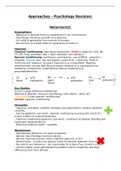Summary
Summary Approaches - Psychology A Level (A*)
- Course
- Institution
Summarised notes for all main approaches in Psychology; including assumptions, theories, key studies and evaluation. (Behaviourist, SLT, Biological, Psychodynamic, Cognitive, Humanistic) These notes helped to achieve A-A* in all assessments and an A* in my final exam.
[Show more]



